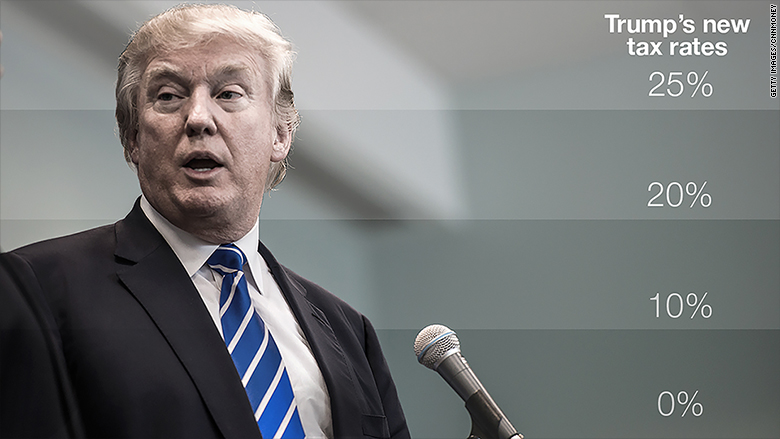Trump Supports Tax Increase for Wealthy Americans Proposal

In a surprising turn of events, Trump supports a tax increase for wealthy Americans, signaling a potential shift in the traditional stance of the Republican Party towards taxation. The former president, while engaging in discussions about the GOP’s upcoming tax legislation updates, expressed a willingness to consider raising taxes on high earners. However, he simultaneously advised caution, suggesting that his fellow Republicans might want to oppose such measures. Trump’s recent comments on social media reflect his commitment to balancing fiscal responsibility with the needs of lower and middle-income workers. This proposal also hints at a more comprehensive Trump tax proposal that could include exemptions for small businesses while tackling the contentious issue of a Republican tax increase in a divided Congress.
In an unexpected development, the dialogue surrounding wealth taxation has been reignited as Donald Trump contemplates a more progressive tax policy aimed at affluent individuals. This potential move could redefine the contours of tax legislation under Republican leadership, focusing on equitable fiscal contributions from wealthy Americans. Trump’s outreach to key House figures includes discussions about extending various tax relief measures while possibly imposing higher tax brackets for top earners. Notably, the conversation also brings small business tax exemptions into focus, suggesting a dual approach to ensuring that the tax burden is shared fairly without stifling economic growth. The proactive stance on these issues reflects an evolving perspective within the party as it navigates the complexities of fiscal policy in the current political landscape.
Trump’s Unexpected Support for Tax Increases on Wealthy Americans
President Donald Trump’s recent endorsement of a tax increase for wealthy Americans marks a surprising departure from traditional Republican fiscal policies. During discussions with House Speaker Mike Johnson, Trump cautiously suggested that a ‘tiny’ tax hike might be acceptable if it benefits lower and middle-income workers. This public acknowledgment could reshape the ongoing dialogue about tax legislation within the GOP, especially considering Trump’s previous promises to cut taxes for high earners.
However, Trump’s stance raises important questions about the political ramifications of supporting tax increases for the rich. Many Republicans may view this move as a departure from their long-standing commitment to tax cuts, potentially spurring internal party debates. Trump’s framing of this tax hike as a necessary step to help average workers could challenge the party’s narrative, urging lawmakers to consider their constituents’ needs in an evolving economic landscape.
Implications of Trump’s Tax Proposal on Republican Strategy
The implications of Trump’s support for a tax increase on the wealthy could significantly impact Republican strategies moving forward. With upcoming elections on the horizon, GOP leaders may need to recalibrate their message to either align with Trump’s new position or risk alienating segments of their base. This could set the stage for a contentious debate on how to balance tax reforms with the party’s fiscal responsibilities, especially as they contend with Trump’s calls for maintaining substantial tax cuts.
As the party navigates these waters, the challenge will be implementing effective tax legislation updates that satisfy diverse interests, including those of small business owners. Trump’s suggestion of an exemption for small businesses may serve as a compromise that can appease both sides, potentially giving Republicans a unifying approach to move forward. Addressing the economic needs of small business owners while contemplating increased taxes on the wealthy could become pivotal in formulating a cohesive tax plan.
Balancing Tax Legislation and Fiscal Responsibility
In the face of Trump’s tax proposal, Republican leaders must find a way to reconcile the demands for tax cuts while considering the fiscal consequences of raising taxes on high earners. The GOP’s desire to fanfare tax cuts risks escalating deficits if not carefully managed alongside potential tax increases. House Ways and Means Committee Chairman Jason Smith’s forthcoming discussions with Trump will be crucial in determining how to craft a bipartisan bill that addresses both needs without triggering backlash from fiscally conservative members.
As the party grapples with these challenges, it is essential to remember the lessons from past tax legislation attempts. The inclusion of exemptions, such as those for small businesses and other strategic measures, could prove beneficial, but Republicans must proceed with caution. The long-standing promise to uphold tax cuts could be jeopardized if the party does not approach these complex discussions thoughtfully, ensuring that they do not lose sight of their core economic principles.
The Role of Small Business Tax Exemptions in Current Proposals
Trump’s proposal entailing a small business tax exemption reflects a keen understanding of the economic landscape that many Americans currently face. By allowing small business owners to benefit while imposing a tax increase on wealthier individuals, the GOP could potentially strike a delicate balance. This approach might ensure that small enterprises, which are the backbone of the economy, are not unduly burdened while addressing income disparity.
Furthermore, reinforcing support for small businesses in tax legislation could serve as an effective talking point for Republicans as they campaign for votes. Emphasizing how these businesses fuel job growth and economic recovery could win over constituents who may be skeptical about tax increases for the wealthy. It represents an opportunity for Republicans to showcase a blend of fiscal responsibility and empathy towards struggling workers and business owners alike.
Potential Challenges Ahead for GOP Tax Reforms
The future of GOP tax reforms remains uncertain as they grapple with internal conflicts about tax policy, particularly concerning Trump’s newfound stance on increasing taxes for the wealthy. Republican leaders must be acutely aware of the potential backlash from their base, which has long championed tax reductions. The division could hinder their legislative efforts if a consensus is not reached, particularly with an election year fast approaching.
Moreover, the juxtaposition of Trump’s support for tax hikes against his historic commitments can lead to fractures within the party. Navigating these tensions while remaining unified will be crucial for fostering public support. The ability of Republican leaders to articulate a clear, coherent tax strategy that includes both higher taxes for the wealthy and exemptions for small businesses could determine their success in passing meaningful tax legislation.
Trump’s Approach to Closing Loopholes and Tax Fairness
In conjunction with contemplating tax increases for the wealthy, Trump has also proposed closing the ‘carried interest loophole,’ a controversial element in the tax code that many argue disproportionately benefits wealthier investors. This move is likely to resonate with those advocating for greater tax fairness, addressing the growing concern about the disparity between tax burdens on ordinary workers compared to high-income earners.
By targeting this loophole, Trump may be positioning himself as a mediator who is willing to confront issues of tax equity, potentially bridging the gap between tax reform advocates and those who resist any higher taxes. The implications for Republican policy could be significant if this approach gains traction, leading to a more comprehensive debate about the equity of the tax system and what changes are necessary to achieve broader economic fairness.
Public Reception of Trump’s Tax Remarks
Public reception to Trump’s recent tax remarks has been mixed, reflecting the contentious nature of tax policy. While some constituents appreciate any proposed increase on wealthy Americans as a means to aid lower income groups, others feel concerned about the integrity of previous Republican promises. This presents a complex narrative for Trump and his party as they seek to galvanize support amidst evolving public sentiment on taxation.
Furthermore, Trump’s invocation of past political repercussions, like George H.W. Bush’s ‘Read my lips’ moment, highlights the precarious nature of fiscal promises. As Republicans move forward with these discussions, they must be wary of perceived contradictions that could alienate voters. Crafting a message that addresses both the necessity of potential tax increases and the importance of maintaining party principles will be vital in ensuring public support.
Economic Context Influencing Tax Proposals
The current economic context is heavily influencing Trump’s tax proposals, as rising inflation and shifts in consumer behavior have placed financial pressures on many American families. In light of these challenges, the call for increased taxes on wealthy Americans could be seen as a necessary step toward fostering greater economic equity and providing support to those in need. Republicans must assess these conditions carefully to understand how best to communicate their tax strategies.
As discussions progress, it is essential for the GOP to address the impact of these proposed changes on both the economy and individual taxpayers. An effective strategy will require balancing tax reforms that stimulate growth with the necessary adjustments to ensure adequate funding for social programs, thereby enhancing the party’s appeal during times of economic uncertainty.
Future Outlook on Republican Tax Policies
As Republicans navigate this evolving landscape, the future of tax policies under Trump’s leadership remains a focal point for party identity and electoral strategy. The potential acceptance of a tax increase for the wealthy could signal a shift in how the GOP approaches its messaging and policies moving forward. It will be crucial for the party to leverage this moment to solidify their position as representatives of both traditional fiscal conservatism and progressive tax reform.
Ultimately, the effectiveness of these policies will hinge on the GOP’s ability to appeal to a broad spectrum of voters while maintaining coherence within the party. As they venture into legislative discussions regarding taxes, the known unpredictability of Trump’s messaging could either bolster or hinder efforts to establish a unified front on tax legislation. The coming months will provide critical insights into how these dynamics will play out in the political arena.
Frequently Asked Questions
What does Trump’s support for a tax increase for wealthy Americans entail?
Trump has indicated a willingness to consider a tax increase for wealthy Americans as part of a broader tax proposal aimed at benefiting lower and middle-income workers. This suggests potential modifications to current tax legislation, indicating a shift in traditional Republican views on taxing the wealthy.
How does Trump’s tax proposal differ from traditional Republican views on taxation?
Traditionally, Republicans have opposed tax increases for the wealthy, favoring tax cuts instead. Trump’s recent support for a potential tax increase signals a notable departure from this stance, urging a careful approach that balances supporting lower-income groups while also considering his party’s fiscal conservative principles.
What are the implications of Trump’s tax proposal on small business tax exemptions?
In discussing the potential tax increase for wealthy Americans, Trump emphasized the importance of creating exemptions for small business owners. This would allow those who report business income on individual tax returns to avoid higher taxes, aiming to protect small business interests while addressing the concerns of wealthier individuals.
What are the key features of the tax legislation updates being discussed?
The updated tax legislation being considered includes a potential new tax bracket for top earners, a proposed increase in taxes on wealthier Americans, and the closing of the carried interest loophole. These developments reflect Trump’s negotiations with GOP leaders as they work to craft a balanced bill.
How does Trump’s cautious stance on a wealthy Americans tax increase impact GOP unity?
Trump’s cautious support for a tax increase on wealthy Americans creates a complex dynamic within the GOP. While it might appeal to certain factions advocating for lower-income support, it risks triggering opposition from traditional conservatives who prioritize tax cuts, thereby complicating party unity on tax and spending issues.
What strategic goals is Trump aiming to achieve with the tax proposal?
Trump aims to position himself as a leader willing to make compromises for the benefit of lower and middle-income workers, while also navigating the challenges of maintaining GOP support. His tax proposal seeks to balance significant tax cuts with necessary funding measures, demonstrating a commitment to fiscal responsibility.
| Key Point | Details |
|---|---|
| Trump Supports Tax Increase | Trump cautiously endorsed raising taxes on the wealthiest Americans, suggesting that it could benefit lower and middle-income workers. |
| Proposal of Exemption | He proposed an exemption for small business owners who report their income on individual tax returns. |
| Political Implications | Trump acknowledged that this tax increase might face opposition from fellow Republicans and expressed mixed feelings on its feasibility. |
| Historical Reference | He compared the situation to George H.W. Bush’s broken promise not to raise taxes, suggesting it could be a political liability. |
| Addressing Fiscal Concerns | Trump aims to balance tax cuts with fiscal responsibility, as GOP leaders face challenges in financing the proposed tax cuts. |
Summary
Trump supports tax increase for wealthy Americans, indicating a shift in traditional Republican views. This cautious endorsement of a tax increase for the wealthiest is complemented by a proposal to exempt small business owners. Trump’s comments reflect the political complexities surrounding tax policies, especially in a divided Congress, and engage in a dialogue about how such measures could impact lower and middle-income workers. His historical references suggest an awareness of the potential political fallout, emphasizing the need for a careful approach to fiscal strategies. As discussions unfold, the dynamics within the GOP and the financial implications of these tax strategies will be critical in shaping the future of tax legislation.



